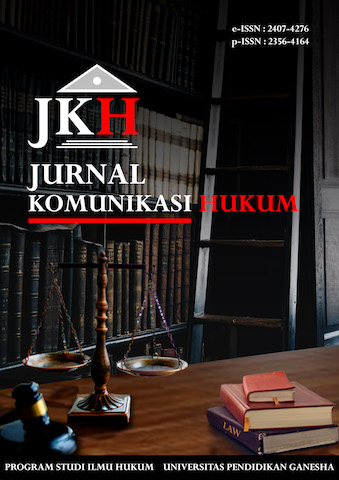ANALISIS HUKUM SABOTASE DAN TINDAK PIDANA PADA WAKTU PERANG DALAM UNDANG-UNDANG NOMOR 1 TAHUN 2023 TENTANG KITAB UNDANG-UNDANG HUKUM: AREA, CAKUPAN, ORIENTASI DAN FORMULASI KEJAHATAN PERANG
Abstract
War crimes in Law Number 1 of 2023 concerning the Criminal Code (UU KUHP) undergo a process of dynamical regulation through a process of discourse, pros and cons as well as a continuous and continuous process of public participation. recognize, regulate and punish war crimes as crimes in the national legal system. Regulatory material, namely the area, scope, orientation and formulation of war crimes as a type of international crime that is extraordinary in nature, becomes a negative discourse in the Criminal Code Law, especially in the formulation of elements of crime, types of crimes, situations, criminal responsibility and law enforcement. The analytical framework in this paper uses a legal positivism approach by comparing the substance and legal procedures for regulating war crimes in international law as best practice for war crimes content material in the Criminal Code Law. The purpose of regulation is to achieve the rule of law in the form of increasing fairness, certainty and expediency as an indicator of analysis by reducing the possibility of discrepancies between what is written (das sollen) and what is happening (das sein), ambiguity or regulatory ambiguity, the possibility of overlapping authority. enforcement of war crimes laws, the possibility of the absence of law and the possibility of conflicting norms between international war crime arrangements (standards) in the Criminal Code Law. This paper concludes that the regulation of war crimes in the Criminal Code reduces the basic principles of enforcing existing war crimes law and narrows the definition of war crimes. The consequence is that the bill actually strengthens the gaps, ambiguity, overlap and conflicts of war crime norms in the future in the Indonesian national criminal law system.
Downloads
Published
How to Cite
Issue
Section
License
Authors who publish with this journal agree to the following terms:- Authors retain copyright and grant the journal right of first publication with the work simultaneously licensed under a Creative Commons Attribution License that allows others to share the work with an acknowledgement of the work's authorship and initial publication in this journal.
- Authors are able to enter into separate, additional contractual arrangements for the non-exclusive distribution of the journal's published version of the work (e.g., post it to an institutional repository or publish it in a book), with an acknowledgement of its initial publication in this journal.
- Authors are permitted and encouraged to post their work online (e.g., in institutional repositories or on their website) prior to and during the submission process, as it can lead to productive exchanges, as well as earlier and greater citation of published work (See The Effect of Open Access).
Authors who publish with this journal agree to the following terms:
- Authors retain copyright and grant the journal right of first publication, with the work [SPECIFY PERIOD OF TIME] after publication simultaneously licensed under aCreative Commons Attribution License that allows others to share the work with an acknowledgement of the work's authorship and initial publication in this journal.
- Authors are able to enter into separate, additional contractual arrangements for the non-exclusive distribution of the journal's published version of the work (e.g., post it to an institutional repository or publish it in a book), with an acknowledgement of its initial publication in this journal.
- Authors are permitted and encouraged to post their work online (e.g., in institutional repositories or on their website) prior to and during the submission process, as it can lead to productive exchanges, as well as earlier and greater citation of published work (See The Effect of Open Access).












